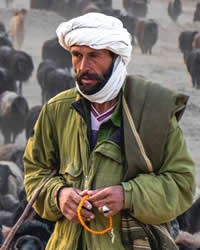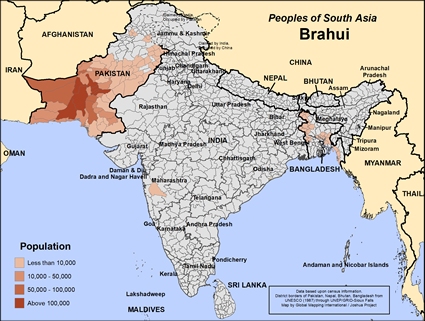Brahui unspecified in Pakistan

Photo Source:
Akhtar Hassan - Wikimedia
Creative Commons
|

Map Source:
People Group data: Omid. Map geography: UNESCO / GMI. Map Design: Joshua Project.
|
| People Name: | Brahui unspecified |
| Country: | Pakistan |
| 10/40 Window: | Yes |
| Population: | 406,000 |
| World Population: | 794,000 |
| Primary Language: | Brahui |
| Primary Religion: | Islam |
| Christian Adherents: | 0.00 % |
| Evangelicals: | 0.00 % |
| Scripture: | New Testament |
| Ministry Resources: | Yes |
| Jesus Film: | Yes |
| Audio Recordings: | Yes |
| People Cluster: | Brahui |
| Affinity Bloc: | South Asian Peoples |
| Progress Level: |
|
Introduction / History
The Brahui of Pakistan reside in Kelat. This area is divided into the highlands of Sarawan and the lowland plain of Kacci. The zones are separated by the Sulaiman and Kirthar mountain ranges and by the 80-mile-long area known as the Bolan Pass. Groups of Brahui can also be found in southern Afghanistan, Iran and Turkmenistan.
The Brahui rose to power by overthrowing a dynasty of Hindu kings in the 1600s. Under Nasir Khan in the 1700s, the confederacy reached its peak. Today, the Brahui are made up a cluster of tribes. Eight of those tribes form what is believed to the original Brahui nucleus. Brahui can be distinguished from their Pushtun and Baluchi neighbors by their Dravidian language, called Brahui.
What Are Their Lives Like?
For years, most Brahui were nomadic shepherds who traveled between the highlands and the lowlands in search of proper temperatures, rainfall, and pasture for their flocks. During the cold and icy winter months, the Brahui lived in the plains. They returned to the hills only after the lambs were born in February or March.
The number of Brahui nomads has consistently declined over the past hundred years, and today there are many fully-settled villages dependent on underground water irrigation to raise the numerous cash crops. There are a number of towns that serve as administrative and commercial centers, although relatively few Brahui live in town year round.
The Brahui shepherds have organized themselves into groups of cooperating households known as khalks. Each khalk combines its herds into one flock under the care of a professional resident shepherd. The resident shepherd controls up to 500 sheep. This procedure benefits the Brahui economically because it allows the men and their adult sons to work on local village farms in exchange for wheat. Having one resident shepherd also enables the men to take their herds to market for sale and to exchange information with other Brahui about the locations of various camps and flocks.
Through the use of khalks, Brahui have become expert shepherds. They have learned the optimum number of sheep that can be grazed together. They also have discovered that sheep are not happy in very small groups, and that they spread and wander under such conditions. When the herds increase to more than 500 animals, leaders "multiply" the group, shifting the tents to form a new khalk.
Marriages are arranged within families. Fathers prefer their sons to marry a cousin on the father's side, although, occasionally, families will consider the wishes of the couple. Men may take multiple wives, but the expenses incurred tend to limit this practice. Divorce is rare among the Brahui. The ideal family consists of married sons who live with their parents. After the father's death, brothers continue to live together with a united family estate under the leadership of the eldest son.
The tribe is the basic political unit of the Brahui. Tribes base their membership on patrilineal descent (common male ancestors) and political allegiance.
What Are Their Beliefs?
Most Brahui are Sunni Muslims. They are deeply rooted in their faith and adhere to the five essential duties of Islam: praying, fasting, giving to the poor, affirming that "Allah is the only God and Mohammed is his prophet," and making a pilgrimage to Mecca.
What Are Their Needs?
They need much intercession, additional evangelical materials, and added laborers who will work with them and be willing adapt to their harsh nomadic lifestyle.
Prayer Points
Ask the Lord to send laborers with servants' hearts to the Brahui to work among them.
Pray that the JESUS Film will be used wisely and that God will bring much fruit as the film is shown to the Brahui.
Pray for Brahui family leaders to have dreams and visions of Christ and will open their hearts to him.
Ask the Lord to raise strong multiplying fellowships among the Brahui.
Pray for the Holy Spirit to give Brahui people teachable and understanding hearts.